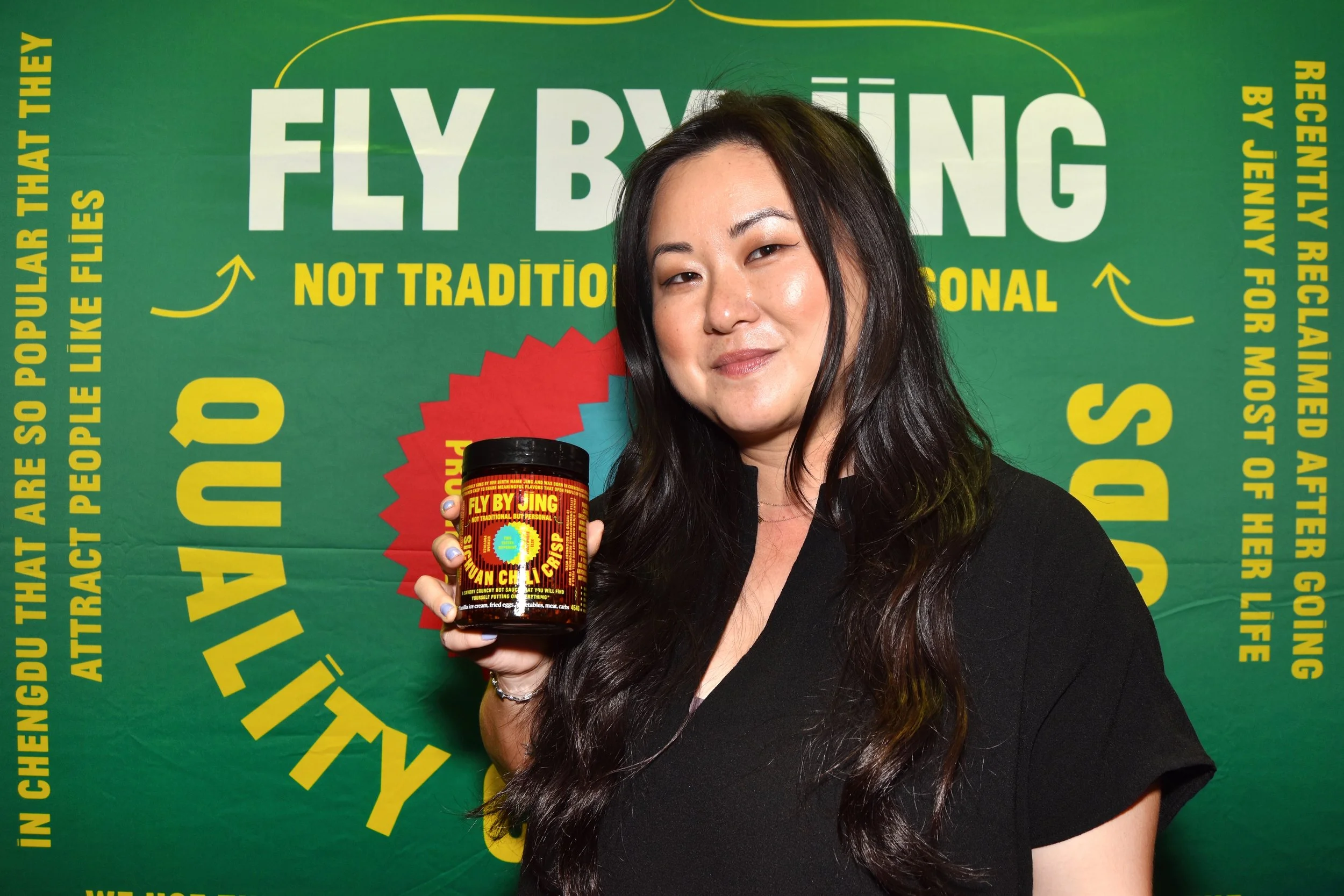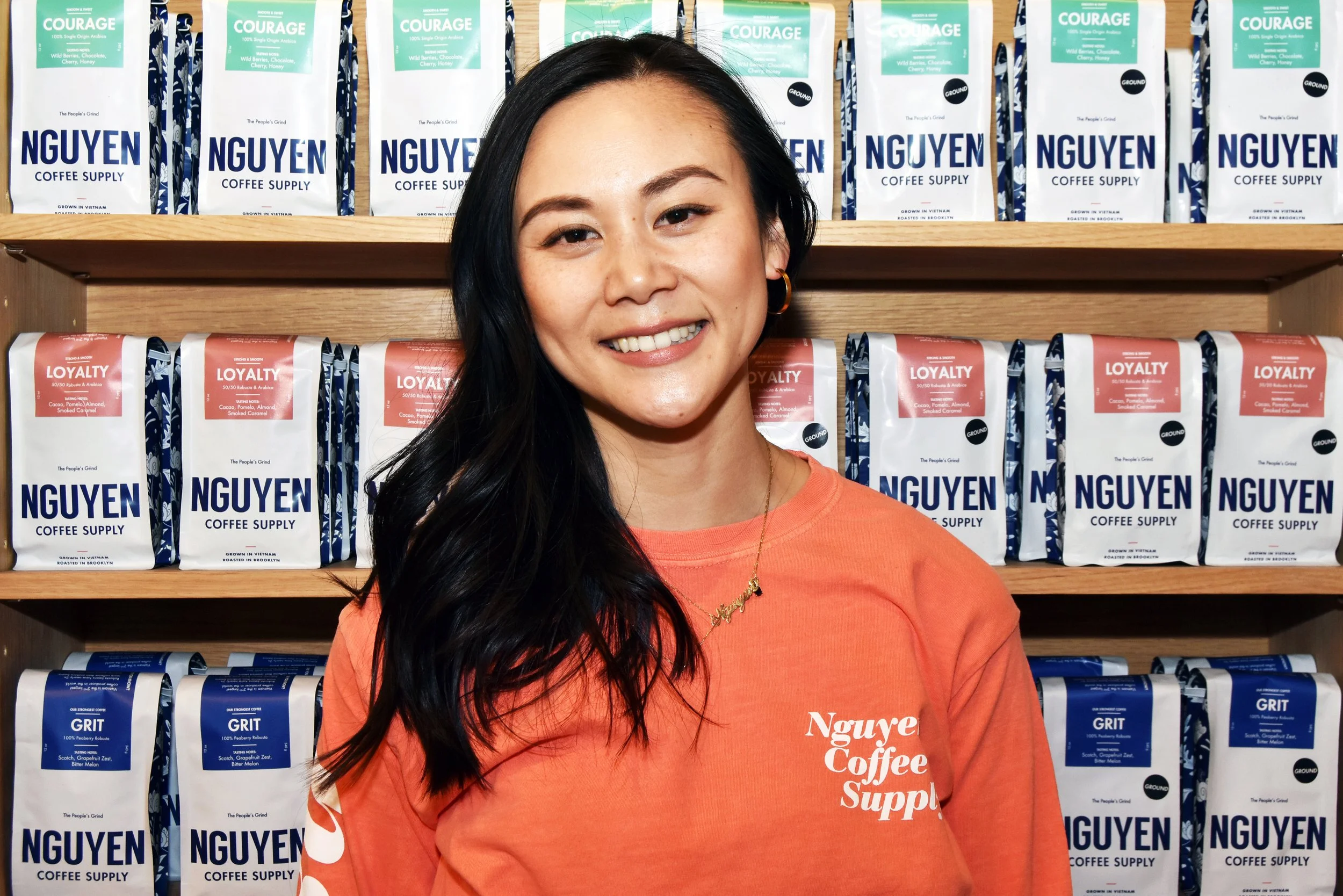Female Entrepreneurs Who Confront a Particular Kind of Troll
Food companies founded by Asian American women find social media engagement with customers helps their growth, but they also face racist and sexist comments.
Jing Gao of Fly By Jing. Photo: Nina Roberts
Published in The New York Times on March 4, 2022
Fly By Jing, an artisanal food business in Los Angeles, is known for its Sichuan chili crisp and good-humored online presence.
The company’s Instagram feed is a mix of photos of luscious dumplings and simmering hot pots, along with more playful visuals, like a surrealist photo collage of chicken feet holding a stack of bok choy heads with a little man nestled inside the leaves. For Lunar New Year, the company featured a video of an older couple calmly eating while a fireworks display exploded outside the window behind them. Even the merchandise has character, like the Auntie Visor, a rainbow-tinted face shield.
Dozens of artisanal food businesses like Fly By Jing — founded by women, immigrants or children of immigrants from East or Southeast Asia — have started over the past several years. They proudly sell items rooted in and inspired by their heritage, like jars of chili oil, spice blends, frozen dumplings, kimchi, imported coffee beans and teas, and ice cream.
For many, a singular online personality helps to create a loyal and passionate consumer base. However, the same technology that allows a company to connect directly with customers can also bring a steady stream of hostility on social media feeds, in DMs and in email inboxes. Besides the standard complaints about late orders or leaky containers, some receive nasty remarks about prices being “too high” for Asian products or challenging the brands’ authenticity, as well as more blatantly racist and misogynist messages.
At a time when violent incidents against Asian Americans are on the rise, this kind of online vitriol isn’t taken lightly. But Fly By Jing has decided that making its customers laugh is one of the best ways to neutralize online trolls.
“We have no problem making fun of those people who are, you know, clearly disturbed,” said Jing Gao, the 34-year-old founder of Fly By Jing. “And our community seems to really love it.”
Last July, for example, Fly By Jing posted on its Instagram page a viral video from China. It was the day before it announced a new funding round by Prelude Growth Partners and the news that its products would be carried nationwide by Whole Foods and Target. The company added its own caption to the video: “… swipe for an ode to the haters.” The camera panned across a group meditation in a park, with the people standing in a circle holding out their middle fingers. The following slides featured screen shots of trolls’ comments paired with Fly By Jing’s pithy comebacks. The post garnered more than 4,500 likes and 400 comments.
“We definitely troll them,” Ms. Gao said, though she conceded that hunting for the best online material to mock her company’s critics sometimes took up energy she didn’t have.
The Pham sisters’ Omson Southeast Asian sampler. Photo: Nina Roberts
Not every owner feels quite the same as Ms. Gao. Kim Pham, 29, who founded Omsom in Brooklyn with her sister, Vanessa, 27, isn’t against the idea of using humor to mock trolls’ comments, but said “there hasn’t been anything funny” about the vitriol aimed at their company online. The sisters, whose parents were refugees from Vietnam, use the phrase “proud, loud” as Omsom’s motto. The start-up makes all-in-one seasoning packets like Thai Larb and Vietnamese Lemongrass BBQ. They’ve sold out of their stock 10 times since starting the business in 2020, Kim Pham said.
Vivid orange, pink and yellow light up Omsom’s online presence. The company’s Instagram feed is a mix of beautifully shot meals, snapshots of the Pham sisters in nightlife attire and posts about issues they’re passionate about, like de-vilifying MSG or the shortcomings of the “ethnic” food category.
“For so long our community has been defined by this model minority myth, of being quiet, or docile, or submissive,” Kim Pham said, “and we really just wanted to give a middle finger to that.”
That stance has been greeted online with abuse.
“In the beginning, it was very difficult on my mental health,” Kim Pham said. After a little research, she said, she came to the realization that “I think it’s par for the course when you are an outspoken brand run by women of color.” Omsom removes clearly insulting commentary on its social media feeds but leaves those that might generate a fruitful conversation.
These companies enjoy engaging with customers who ask questions, because it gives them a chance to explain their products’ origins and how they are typically used. But that changes when the questions turn insulting.
Auria’s Malaysian Kitchen, also in Brooklyn, makes sambal, a traditional chili paste, and other products found in Malaysia like kaya jam. The 53-year-old founder, Auria Abraham, will occasionally take someone to task on social media when a line has been crossed. “I think about it for a while before I do it, because my intention is not to make anybody feel bad,” she said.
“What’s the word for culture-splaining?” Ms. Abraham asked with a laugh, recalling the time a white man who had visited Malaysia once lectured her on Malaysian food.
So when another man, “Don from Philly” as Ms. Abraham refers to him, wrote to her in an email last summer that her sambal oelek recipe wasn’t authentic, she posted part of his message on her Instagram feed. It generated jokes about Pennsylvania being the birthplace of sambal, interspersed with quips and laughing emojis, as well as serious remarks about stepping out of the “good immigrant” role to call out rudeness.
“They come for the person way harder than I ever would!” Ms. Abraham said about her customers and followers. “I can’t say I don’t slightly enjoy that.”
Alli Ball is the founder of Food Biz Wiz, a consultancy in San Francisco that works with early-stage packaged food entrepreneurs. She said that how businesses responded to online trolling could vary.
“I don’t think there’s a right course of action for everyone,” said Ms. Ball, 38. “It depends on your brand style, your brand voice,” along with how much mental and emotional capacity a founder has to respond.
“Jing is this wonderful, sassy woman,” she said of Fly By Jing’s founder, “so it feels aligned with her brand personality.”
Himalayan Dumplings by Kyikyi, in Beaverton, Ore., recently began selling a line of frozen momo. The founder, Tenzin Yeshi — known as Kyikyi — uses her social media platform to raise awareness about all aspects of Tibet, where her parents were born and which they fled for Nepal. So on her Instagram feed, amid photos of succulent momo with bright red dipping sauce were images of Tibetan flags and calls to boycott the Beijing Olympics. An explanatory cooking video about baking round Amdo Phaleb bread, narrated by Kyikyi, mentioned that Amdo, the region where the bread originates, was the birthplace of the Dalai Lama — and that it had been largely absorbed by China.
“When you are a vocal Tibetan, speaking out about our occupation and the persecution, they will just come to you,” Kyikyi said of online trolls.
Sahra Nguyen, founder of Nguyen Coffee Supply. Photo: Nina Roberts
Occasionally Kyikyi writes rebuttals. “I take the time and effort to respond, and be respectful about it, and say, ‘Have a good day,’” she said.
The founder of Nguyen Coffee Supply, Sahra Nguyen, has zero tolerance for trolls. Ms. Nguyen sources her beans from Vietnam, where her parents were born. They eventually fled as refugees to the United States after the Vietnam War. Ms. Nguyen roasted more than 80,000 pounds of beans last year in Brooklyn, the company’s home base.
“As a company, our policy is we don’t engage, we don’t respond,” Ms. Nguyen said. “I don’t want my employees to enter a toxic environment.” Antagonistic or demeaning remarks are deleted or hidden on their online channels.
“It’s about really taking and keeping control of the narrative that we want to share,” she said, adding that she’s also mindful of customers. “I don’t want them to experience that type of negativity, either.”


